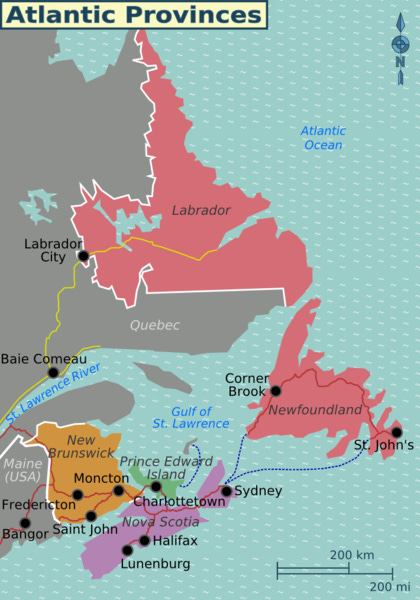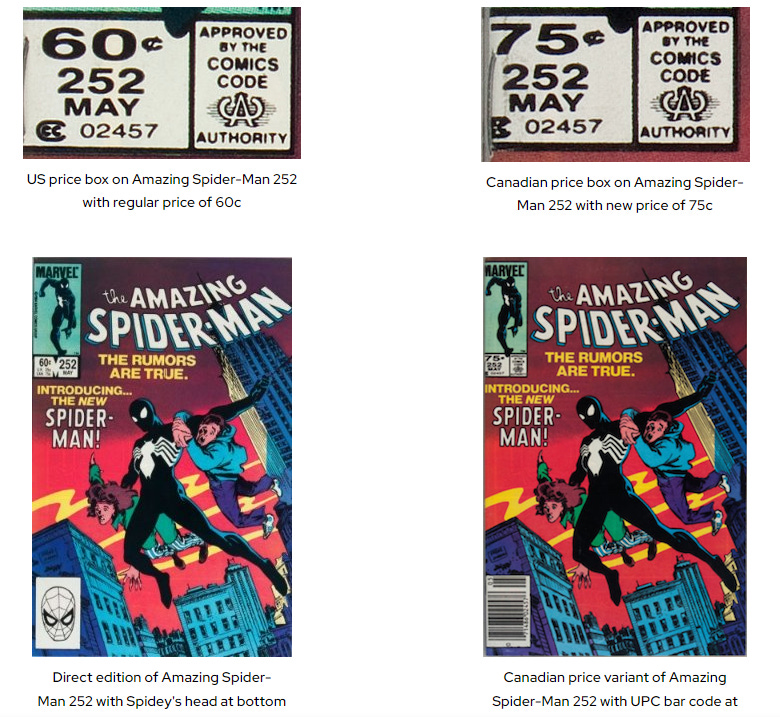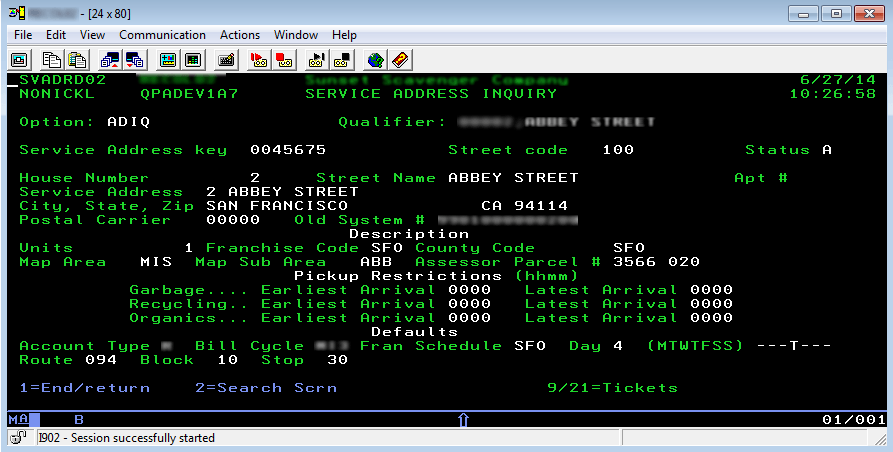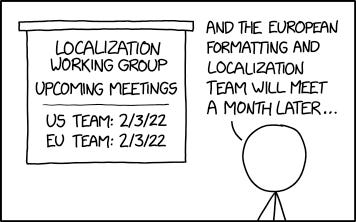Atlantic Canada Mondays - Neither British Nor USian
Cultural identity thwarted by inconsistent implementation and, of course, technology
Dear H.A.T.T.E.R.s, here once again, a reminder of where Atlantic Canada is located before I launch into my diatribe:
We are not the United States1 despite our proximity but Canada (including Atlantic Canada) shares a rather long border with our neighbour and certain US practices influence the 11% (Canada’s population count is equivalent to 11% of the US’s population2). I’m going to focus on two of the milder influences because they contrast with Canada’s British/European heritage.
Also, I don’t have any Atlantic Canada Mondays interviews lined up.
The British U
It make sense that the British (or at least the English) should “own” the English language. Naming rights are meaningful, after all, especially after the Anglo-Saxons3 successfully wrested the language from the Germans.4
So ownership has some perks. The British have their own spellings for words used elsewhere within the Commonwealth or in the United States. One of the key flourishes in British English (now the King’s English, I suppose), is to insert a “u” between the letters “o” and “r”, like the following examples (British compared to the US version):
neighbour vs. neighbor
colour vs. color
flavour vs. flavor
humour vs. humor
labour vs. labor
rumor vs. rumour
Then there’s the use of -ise vs. -ize and a few other things but I want to keep sight of the rabbit hole’s exit.
In Canada we are supposed to use the British spellings. I did very well in English classes in high school but for some reason these rules never stuck. I invariably default to using the US spellings and, as an example, drop the “u”. I’d like to blame this on the omnipresence of US culture but maybe my teachers never pressed the point either. I’m old enough that I really can’t remember which way I was taught.
It might have been the comic books, now that I think about it. I grew up on US comic books, not to mention a diet of mostly US novels, etc. Which is funny, because in the 1980s Marvel and DC published Canadian priced versions of their comic books5 with the price in Canadian dollars, right around the time the Canadian dollar really started tanking.
BUT LOOK. Rumor is spelled with the US spelling on both versions of the cover! Not only did we have to pay a different price6… we didn’t even get Canadian (British) spellings!
Little did they know that I just had to convince my parents to make the short drive to Houlton, ME and I could buy their silly US price comic books. And eventually I could drive myself so I could maintain choice.
Eventually the big comic book publishers changed to a single multinational version of their comic books and so Canadian comic book collectors were mollified.
But I will forever spell rumor incorrectly on the first try. I mean rumour. Which is not a big deal but I always use the US English versions on my computers so I guess we know who to really blame about this.7
H.A.T.T.E.R.s are clever and cosmopolitan enough to recognize (recognise) which word I mean no matter how it’s spelled. Let’s never mention this again, before the jokes go flatter than a punctured tyre.
Date formats
The entire world obsessed over date formats during the Y2K “crisis” in the late 1990s. Most computer systems were not built to handle the change of century as our calendar approached the year 2000. This meant that data that began in the 20th century and extended into the 21st century had a really good chance of being mangled by programs when computer systems had to advance dates to January 1, 2000 and onward.8 Little things like loans, bonds, investments and insurance policies were potentially at risk. And expiry dates of all kinds.
I used to see and use computer screens like this a lot in the earlier years of my day job:
You’ll notice in the upper right corner of the screen is 6/27/14. With some simple knowledge of how a calendar works you can reliably deduce that this date referenced above is June 27, 2014. The date is written in MMDDYY format (month day year). Since you know there are only 12 months in a year you can reliably deduce that 27 is the day and it’s pretty common for the last two digits in this kind of six digit sequence to represent the year. Also, since 14 is greater than 12 you know it can’t be the month, so by process of elimination it must be the year.
This screen is a great example of a confusing aspect of US culture.
Much of the world normally expressed dates in DDMMYY format - day month year. That’s was Canada’s default method for many years and much of rest of the world used that same format. The US used MMDDYY and made it a key component of their computer systems, which they exported globally. So for many years, unless date formatting became more flexible, computer systems like that green/black/white monster above would show MMDDYY format.
Decades later, my mind is still out of sync with DDMMYY format. As a result, unless it’s easily deduced, I always check to confirm if I’m seeing a date in DDMMYY format and MMDDYY. I still work with a lot of people in the US (who are great, by the way, we just do some things a bit differently).
Y2K was the perfect opportunity to standardize everything to YYMMDD format, which makes a lot of calculations easier. A lot of countries use and accept this format, even expanding it to YYYYMMDD to be really clear.
But to this day, if I see a date like 02/03/22 I am going to be forever cursed to think of it as Feb. 3, 2022, no matter what the real date is. So I apologize in advance if March 2, 2022 is important to you.9
I prefer to refer to the United States of America as the US, not America. I tend to think of America as a continent not a country
In true Canadian style I am rounding down: the actual percentage is about 11.5%.
This isn’t a history lesson so please forgive me if I’ve gotten the actual events wrong.
An aside: I have recently watched (and deeply enjoyed) the Netflix series Dark, which was made with German language and is set in a fictional German village. I tried listening to the English dubbed version but got frustrated with it and changed to English subtitles and listened to the actors speaking in their native German. I was intrigued by how much of the German dialog sounded so close to English in places, which intuitively makes sense because much of the English language is derived from German. Also Dark is hella good and you should watch it in either language, as long as you don’t mind a gloomy atmosphere and people staring without speaking for long periods of time.
Not incidentally, Canadian price versions of US comic books were deemed to be less valuable to comic book shop owners and collectors. Jerks.
OK, OK: in theory if we were paying in Canadian $$$ in a Canadian store we should have been paying an equivalent price when you did the exchange conversion. Small comfort when you had a $2 weekly allowance that your parents did not adjust for the exchange rate change! No one appreciates how rough Canadian Gen X really had it. We even had to walk uphill both ways to the comic book store… if there was even one in our town.
Sigh.
TMI: this date problem was the result of shortcuts used when operating system and database makers were hamstrung by the amount of storage space available in computer systems back in the 70s and 80s. Years were typically only represented by the last 2 digits, so 1999 would be represented as 99 but the year 2000 would be represented as 00. As a result, once the computer’s internal calendar switched to 2000 and beyond any dates after that point might seem a century earlier than they were because of these limitations. Any system without the ability to detect the century could have been subject to tons of mistakes and failures. A lot of work went into fixing this and I helped test some of these fixes for my employer, plus also helping my employer to convert some of its divisions to a better type of date storage. So yes, I have done some important stuff.
Actually, it’s important to me: March 2 is the birthdate of a family member! Thankfully I always check.








A brilliant post!
I find the inconsistency in the adjectival forms of some of those words in British English rather curious.
‘Flavour’ becomes ‘flavourful’, and ‘colour’ becomes ‘colourful’. So I’ve always wondered why - also in British English - ‘humour’ becomes ‘humorous’ and ‘glamour’ becomes ‘glamorous’. 🤔
Interesting that you went the American way - I swung harrrrrrd the other way and am resolutely Canadian in my spellings and formats. Definitely parent-influenced (my dad wasn’t going to have any kids writing like Americans, I tell you), but something I made a decision about long ago to resist attempts to Americanize my speech and writing.